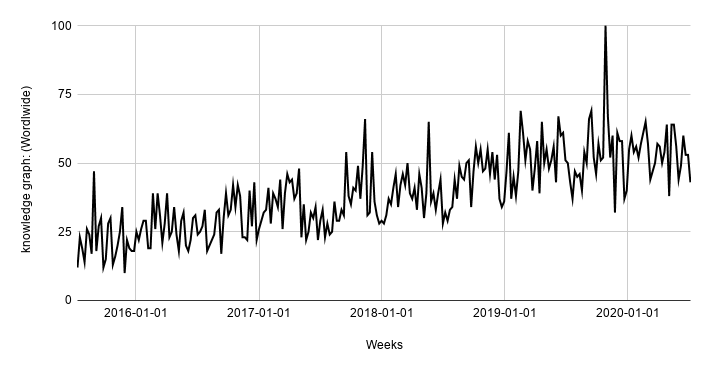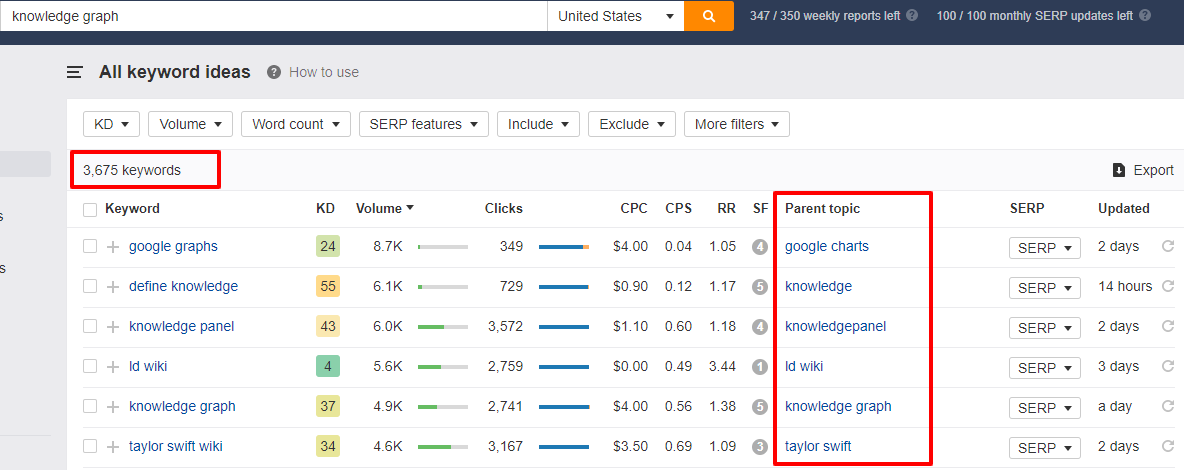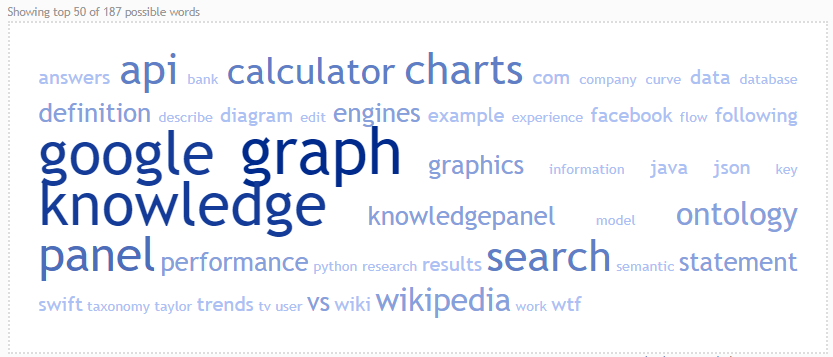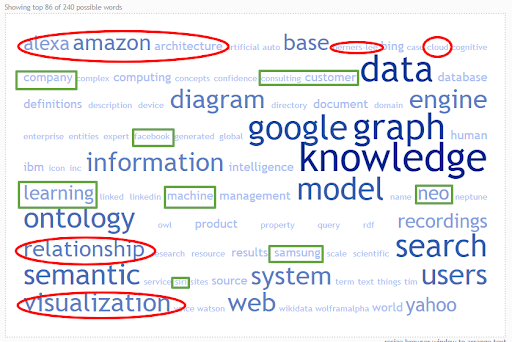TOPIC OF THE MONTH #TOTM: Knowledge Graph
How Knowledge Graphs can help content experts?
It looks like we are experiencing a Knowledge Graph renaissance. This is probably because Google is now a recommendation engine that is able to understand the content available online. If you have not done it yet, I suggest your to read our article about Knowledge Graph which stresses the importance of topics in Search. Also, it is important to mention that for the past five years the search trends regarding “Knowledge Graph” is steadily growing worldwide.

This probably means ontologists and other knowledge graphs experts are now able to highlight the benefits of having or using entities, concepts, knowledge base, linked data and other voices technologies (Alexa, Siri…) within organizations. It actually helps computers to better understand the meaning of all the objects within a database.
By the way, I would like to highlight a very good contribution from Ontotext: in this article, they explain how text analysis can benefit from Knowledge Graphs. Here is an interesting extract:
- Big graphs provide background knowledge, human-like concept and entity awareness, to enable a more accurate interpretation of the text;
- The results of the analysis are semantic tags (annotations) that link references in the text to specific concepts in the graph. These tags represent structured metadata that enables better search and further analytics;
- Facts extracted from the text can be added to enrich the knowledge graph, which makes it is much more valuable for analysis, visualization and reporting.
Thus, once your article is published, algorithms have to understand it before showing it to a search engine user, a social media addict or any online reader. This is possible through a diverse set of topics, well tagged (entities) and linked to a huge knowledge base.
The best content ideas about "Knowledge Graph"
The objective of our TOPIC OF THE MONTH series is to provide content strategists with content ideas about a given Topic – “Knowledge Graph” in today’s post – but also to highlight some specific content strategy issues. In this article, I will compare the results of our Inspiration module to the suggestions of a popular keyword tool such as Ahrefs, one of the best tool in the SEO world.
SPOILER ALERT! This comparison will prove you once again that it is much more fruitful to start your content plan at the topic level than the keyword level.
Ahrefs keyword ideas tool
Here are the suggestions that come from Ahrefs: more than 3K search queries from more than 20+ parent topics. Not bad.

But what matters the most during a content plan brainstorming session is to have a top funnel view. You want to discover and explore a large number of topics and sub-topics before looking at the actual keywords. So for the sake of this comparison, we are going to focus only on their Parent topics suggestions. Here is a top 50 list of suggestions:

Ahrefs recommends to look at the keywords around the following topics:
- Knowledge graph and API
- Knowledge graph and calculator
- Knowledge graph and charts
- Knowledge Graph and Google
- Ontology, etc.
They are good suggestions to start writing on Knowledge Graph, but I believe we can do a better job to inspire content strategists or at least be a good companion to their favorite keywords tools.
BETTER CONTENT Inspiration module
Here are the suggestions that come from our tool:

As you can see, there are some similarities with Ahrefs: they are the mandatory topics you have to cover when you write about “Knowledge Graph”.
- Google knowledge graph
- Search engines use of knowledge Graph
- Data base
- Wikipedia
- Ontology, etc.
However, BETTER CONTENT provides more diverse Topics, including a few that are unique and important such as:
- Knowledge graph and Apple’s Siri
- Knowledge graph and machine learning
- Knowledge graph company or consulting offer
- Knowledge graph relationships
- Knowledge graph visualization
- Knowledge graph and big tech firms: IBM, Facebook, Samsung, Yahoo…
- Knowledge graph and Amazon Alexa: is it surprising to you? It should not because Alexa has its own Knowledge Graph, as explained by their Head Scientist here.

Conclusion
I believe content teams should replace the keyword research process by a topic research process. As seen above, BETTER CONTENT and Ahrefs can really support a content team during their content discovery phase. However we believe that the more diverse and relevant the topics are, the better the brief or content calendar will be. What do you think? How do you build your editorial plan?
Additional resources
I suggest you to browse the following websites if you’d like to explore further the fascinating world of Knowledge Graphs 😉
https://www.ontotext.com/knowledgehub/fundamentals/what-is-a-knowledge-graph/
https://www.seobythesea.com/2019/11/user-specific-knowledge-graphs/
